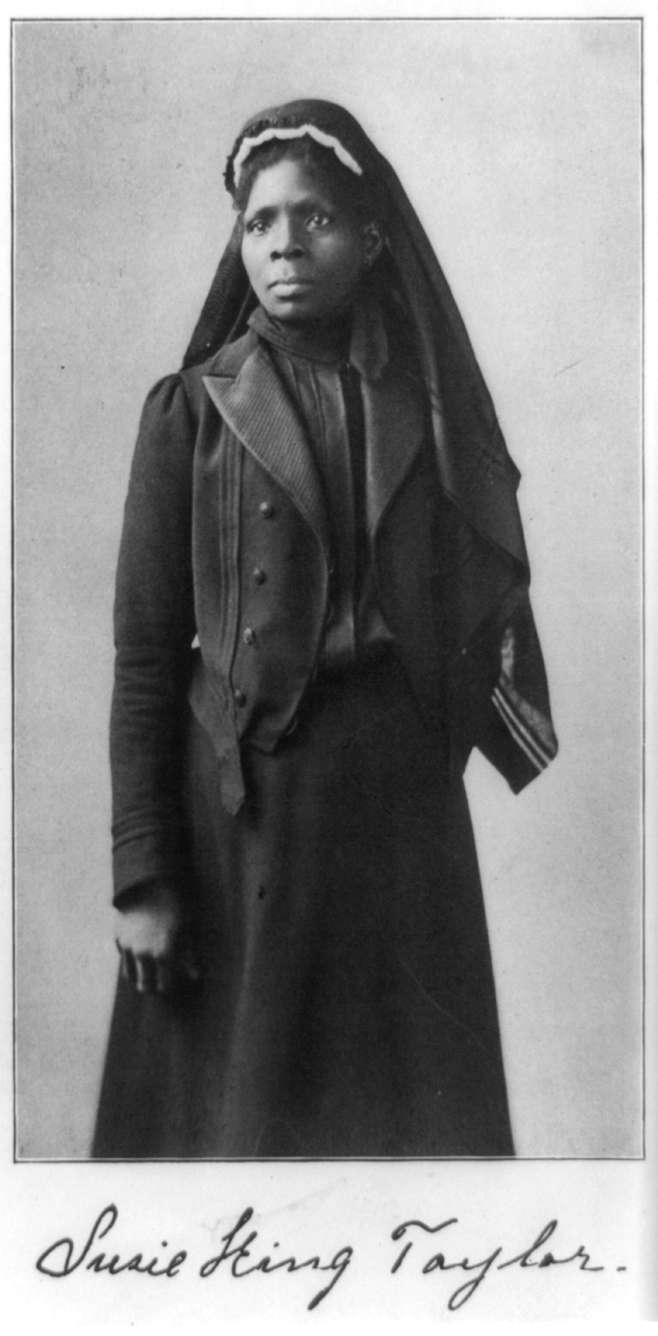‘I learned to handle a musket very well while in the regiment, and could shoot straight and often hit the target’
Susie King Taylor (1848-1912) was born into slavery in Georgia, USA, and went on to become the first African American Civil War Army nurse who served with a segregated Black army regiment, the 1st South Carolina Volunteers. An inspirational and renowned educator, she taught formerly enslaved children and adults in day and night schools in Savannah, Georgia. In 1902 she published her powerful autobiography, ‘Reminiscences of my life in camp with the 33d United States Colored Troops, late 1st S.C. volunteers’.
Extract:
‘The first colored troops did not receive any pay for eighteen months, and the men had to depend wholly on what they received from the commissary, established by General Saxton. A great many of these men had large families, and as they had no money to give them, their wives were obliged to support themselves and children by washing for the officers of the gunboats and the soldiers, and making cakes and pies which they sold to the boys in camp. Finally, in 1863, the government decided to give them half pay, but the men would not accept this. They wanted "full pay" or nothing. They preferred rather to give their services to the state, which they did until 1864, when the government granted them full pay, with all the back pay due.
...
FORT WAGNER being only a mile from our camp, I went there two or three times a week, and would go up on the ramparts to watch the gunners send their shells into Charleston (which they did every fifteen minutes), and had a full view of the city from that point. Outside of the fort were many skulls lying about; I have often moved them one side out of the path. The comrades and I would have quite a debate as to which side the men fought on. Some thought they were the skulls of our boys; others thought they were the enemy's; but as there was no definite way to know, it was never decided which could lay claim to them. They were a gruesome sight, those fleshless heads and grinning jaws, but by this time I had become accustomed to worse things and did not feel as I might have earlier in my camp life.
It seems strange how our aversion to seeing suffering is overcome in war,-- how we are able to see the most sickening sights, such as men with their limbs blown off and mangled by the deadly shells, without a shudder; and instead of turning away, how we hurry to assist in alleviating their pain, bind up their wounds, and press the cool water to their parched lips, with feelings only of sympathy and pity.
...
About four o'clock, July 2, the charge was made. The firing could be plainly heard in camp. I hastened down to the landing and remained there until eight o'clock that morning. When the wounded arrived, or rather began to arrive, the first one brought in was Samuel Anderson of our company. He was badly wounded. Then others of our boys, some with their legs off, arm gone, foot off, and wounds of all kinds imaginable. They had to wade through creeks and marshes, as they were discovered by the enemy and shelled very badly. A number of the men were lost, some got fastened in the mud and had to cut off the legs of their pants, to free themselves. The 103d New York suffered the most, as their men were very badly wounded.
My work now began. I gave my assistance to try to alleviate their sufferings. I asked the doctor at the hospital what I could get for them to eat. They wanted soup, but that I could not get; but I had a few cans of condensed milk and some turtle eggs, so I thought I would try to make some custard. I had doubts as to my success, for cooking with turtle eggs was something new to me, but the adage has it, "Nothing ventured, nothing done," so I made a venture and the result was a very delicious custard. This I carried to the men, who enjoyed it very much. My services were given at all times for the comfort of these men. I was on hand to assist whenever needed. I was enrolled as company laundress, but I did very little of it, because I was always busy doing other things through camp, and was employed all the time doing something for the officers and comrades.
